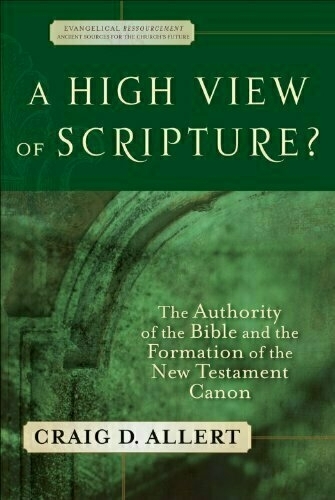A High View of Scripture?
About a year ago I started getting interested in historical criticism as it relates to the Bible. As I explored and read several books, I kept wondering: where was this discussion, or even the acknowledgement of this topic, in the evangelical tradition in which I grew up?
Most all I’ve ever encountered in evangelicalism in this area is that the Bible is made of up 66 books, that they’re “inspired” and “inerrant”, with varying levels of nuance about what those terms mean. I can’t remember ever hearing a discussion about how, when, or by whom the books of the OT and NT were assembled; only that that the collection of 66 is canonical and that’s basically that.
Where, I lamented on Twitter, were any evangelical takes on anything approaching historical criticism? This question did lead to a dear Episcopal priest in Wisconsin sending me three of his seminary textbooks on the topic (thanks again, Rev. Mike!), but from the evangelical perspective, I didn’t encounter anything much more nuanced than what I found on the “God said it, I believe it, that settles it” bumper sticker.

Enter Dr. Craig Allert’s A High View of Scripture?: The Authority of the Bible and the Formation of the New Testament Canon. Allert is a professing evangelical and professor at Trinity Western University in British Columbia. A High View of Scripture? is published by Baker Academic as a part of their “Evangelical Ressourcement” series. The book’s purpose, says Allert in the introduction, is to “investigat[e] the implications of the formation of the New Testament canon on evangelical doctrines of Scripture.”
This study has been lacking in evangelicalism, he says, and we are poorer for it.
[The] neglect of the canon process has left evangelicals with an inadequate understanding of the very Bible we view and appropriate as authoritative. For the most part, evangelicals seem unconcerned with how we actually got our Bible, and when we do show interest, we rarely relate the implications of this concern to how this might affect a doctrine of Scripture. This is ironic since evangelicals hav been quite loud in proclaiming the ultimate authority of the Bible; surely that proclamation should be informed about how the Bible came to be.
Dr. Craig Allert, A High View of Scripture?, p. 12
In A High View of Scripture?, Allert draws heavily on the church fathers and early church writings to distinguish between Scripture and canon, to explore how the word “inspiration” was used early on to describe various writings and practices, both canonical and not, and how the church wrestled with the question of what writings were considered canonical well into the 4th century.
After taking a few chapters to overview the history, Allert asks some hard questions about how we should have that history inform our doctrine of Scripture. How should it affect our understanding of Scripture when we acknowledge that these “inspired” texts were not delivered on a platter as an autographed, bound volume, but were assembled and agreed upon by the church over a period of more than three hundred years?
Allert affirms the authority and inspiration of Scripture, but balks at “inerrancy”, since the Scripture doesn’t use that word of itself, and since the definitions of “inerrancy” are challenging, frequently seeming to be constructed post hoc in support of the theologian’s predetermined interpretations. While evangelicals prefer to be known as focused on “the Book” and dismissive of “tradition”, Allert insists that we can’t have a healthy doctrine and understanding of Scripture without acknowledging and embracing the fact that the early church played a key role in the formation of the canon of Scripture and what it means.
I very much appreciated A High View of Scripture? and would highly recommend it to my evangelical friends. We need more of this sort of thing. Not to use historical “criticism” to diminish the Scripture, but to reject the impulse to skittishly rush past canon formation on our way to Scriptural authority, and to recognize that our reliance on the Scripture need not be weakened by acknowledgement of the human participation in its writing and assembly.